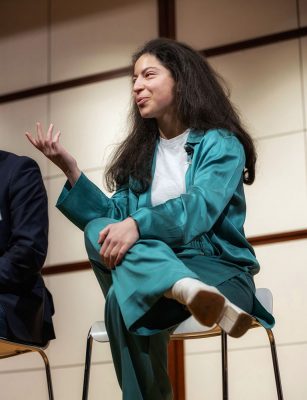Ameera Hammouda said she was “born to be an entrepreneur” and has dreamt of having her own clothing brand since she was a kid. Now, that is her reality.

Hammouda, a 2018 graduate from Boston University’s Questrom School of Business, is the CEO and founder of Ameera — a clothing brand that caters to modest style and strives to counter societal stigmas and norms. Hammouda said she wanted to combine fashion with a higher purpose within her company to serve a certain community and spread awareness.
“Especially it being modest fashion, there’s such a stigma with that whole community and how they dress and it’s like, ‘oh, she’s oppressed,’” Hammouda said. “So I was like, no, I can show people that people choose to dress this way and it can be beautiful and empowering.”
Hammouda officially launched her brand in June of 2021 and gave her Instagram account a reboot, which she said was previously dedicated to her jewelry business. Her business is all online, she ships internationally, has done a few pop-ups and is hoping to do her first New York pop-up this year.
“I’m kind of scared to get too involved in fashion and trends because then I feel like I lose my own creativity,” Hammouda said. “My personal style was so important to me like I was so into clothing, and I didn’t have a lot of clothing.”
Extra care and time is devoted to her products to make sure her clothing is worth putting out there and can be versatile, she said. In the future, she wants to release more styles but at the moment, she has released a colorful variety of blouses, slacks and scarves made out of “biodegradable, machine washable silk and carbon positive hemp fabric,” according to Ameera’s website.
In addition to her brand, Ameera also started a newsletter, Ameeracan, to combine her passions for writing, fashion and to open up a place to discuss modest fashion in Muslim women lifestyle that hasn’t really been talked about before, she said.
“Changing all the stigmas and changing all the fake news or whatever out there around these women … [Ameeracan] can be a place where I can discuss those topics,” Hammouda said. “And also, I realized, being more of an expensive brand, it’s a way to kind of allow more people to interact with the brand who necessarily might not have been able to.”
Ameeracan has “room for growth” and the newsletter is not exactly where she said she wants it to be, but reminds herself, “you have to start somewhere right.”
Hammouda also said other than actually making the clothing, she had a “hand in all aspects” of her brand, and learned a lot from mistakes and things she wasn’t expecting.
“That was definitely hard, especially being an amateur, like I don’t have a formal fashion background,” Hammouda said. “I think that is definitely one of the biggest challenges but like I said, I found some amazing people who can help me answer very specific questions like ‘what kind of stitch do you want? And I’m like, what? I thought everything had the same stitch.’”
She said she has also received a lot of support from friends, family and professors from BU, mentioning Peter Marton and Jodi Luber.
“I first met Ameera when she appeared in my entrepreneurship class over at the business school,” Marton, a senior lecturer in Questrom, said. “I was immediately struck by her level of determination and creativity and thoughtfulness.”
Marton also said that one of Ameera’s strengths was her authenticity — she wasn’t just mirroring the motions like other entrepreneurs.
Luber, an associate dean and associate professor in the College of Communication, said she first met Ameera when she was the only Questrom student to take one of her courses.
“Behind the amazing style, however, is a fiercely talented and focused entrepreneur who is serious about business. She’s got grit,” Luber said. “I’ve listened to her talk about distribution, manufacturing costs, production, and vendor relationships as if she had a team of 20 behind her, and she has had to learn all of these things on her own.”
Luber said Hammouda’s success is a credit to an “untapped niche” she found in her brand and what it stands for is “meaningful to a lot of women.”
“There’s obviously a very specific target customer that I’m speaking to, and hoping to amplify their voices, especially, women of certain faiths, who choose to dress modestly,” Hammouda said.
















































































































